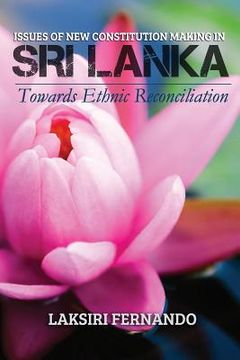Issues of New Constitution Making in Sri Lanka: Towards Ethnic Reconciliation (in English)
Synopsis "Issues of New Constitution Making in Sri Lanka: Towards Ethnic Reconciliation (in English)"
This is a collection of essays and articles written and mostly published from time to time covering various issues of constitution making in Sri Lanka. The focus of all of them is ethnic reconciliation. The timing of this publication is the ongoing efforts in Parliament in consultation with the public and various stakeholders in drafting a new constitution and adopting it in Parliament subsequently endorsed by a referendum, according to the constitutional provisions of the present Constitution (1978). Referendum for a new constitution is an important constitutional requirement. Therefore, it should be said at the outset that no 'constitutional revolution' is anticipated in this effort like in 1972. The rationale or the felt need for a new constitution is long standing although this is going to be the fourth constitution of Sri Lanka, if it is successful, since independence in 1948. Admittedly, therefore, there has been some continuous disequilibrium in constitutional matters in the country. The first constitution or popularly called the Soulbury constitution was primarily a document drafted by the colonial state makers, Lord Soulbury and Sir Ivor Jennings, of course in consultation with the elected representatives of the country. However this constitution lasted for 25 years from 1947 to 1972 without much upheaval. In contrast, the first indigenous and the first republican constitution of 1972 survived only for six years. The second republican constitution of 1978 is still in operation for 38 years but largely due to its rigidity than any inherent quality of popular acceptance. Since 1994, there have been several fervent efforts to overhaul it but without any success. In August 2000, the effort to inaugurate a new constitution came very close, but failed, the opposition members of parliament burning the draft agreed by the leaders during by-partisan negotiations. One advantage of constitution making process today is the existence of a 'national unity' government of the two main political parties, the UNP and the SLFP, also with the connivance of the official opposition, the TNA, representing the Northern Tamil constituency. Therefore, at least on appearance, there seems to be some broad consensus for the need for a new constitution. This could however be illusory, considering the rifts within the 'national unity government' itself on some of the key constitutional issues, and the stance of the almost breakaway Joint Opposition (JO) from the SLFP/UPFA led by the former president, Mahinda Rajapaksa, among other factors. In a recently held 'foot-march' (Pada Yathra) of the JO (28 July - 1 August), one of the main slogans was the claim that 'a new constitution is a death trap.' In addition, on the issue of passing the Office on Missing Persons (OMP) Bill, the behavior of the Joint Opposition has heralded what they might do during the inauguration of a new constitution. There is no single theme or discourse underlying the present publication, except the need for a new constitution reforming many of the institutional and legal anomalies of the present constitutional system, and creating a balance between divergent political views in order that a workable 'constitutional equilibrium' is created for a foreseeable future. This is by no means an easy task. There is no apparent readymade agreement between the main political parties, the UNP, the SLFP, the TNA or the JVP, except the need for a new constitution. What elements could create a sustainable 'constitutional equilibrium' is also not a self-evident matter.

